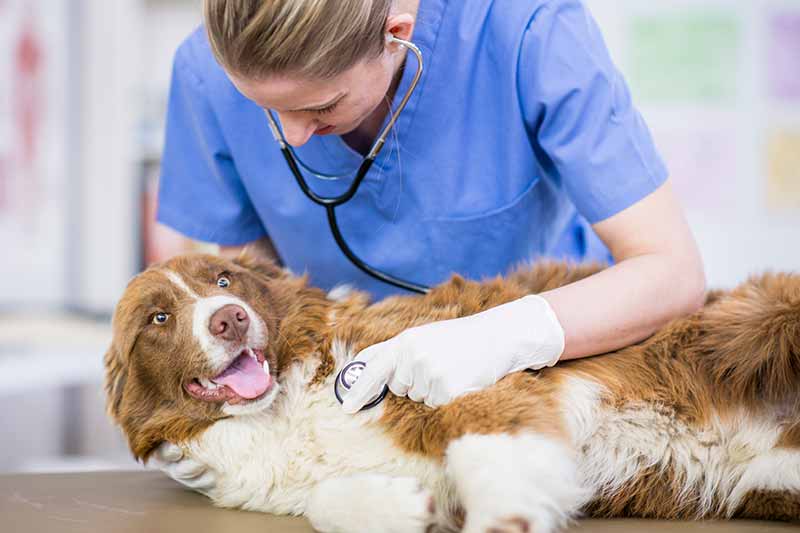Comprehensive Guide to the Solutions Provided by a Vet Oncologist
Veterinary oncology encompasses a vast variety of services focused on diagnosing and dealing with cancer cells in pets. Pet Cancer Surgery. Oncologists utilize advanced analysis strategies and provide numerous treatment choices customized to every animal's demands. They likewise focus on supportive care and give important resources for family pet owners. Comprehending these solutions is important for making educated decisions. What details aspects of veterinary oncology can especially impact a family pet's treatment journey?
Understanding Vet Oncology
Vet oncology is a specialized field concentrated on detecting and treating cancer cells in animals. This self-control incorporates a vast array of approaches, from medical treatments such as radiation treatment and immunotherapy to medical interventions intended at getting rid of lumps. Veterinary oncologists are trained to recognize the unique symptoms of cancer cells in different varieties, allowing them to customize therapy plans to private clients.
In enhancement to typical therapies, vet oncology highlights helpful treatment, which plays an essential role in enhancing the lifestyle for afflicted animals. This consists of discomfort administration, dietary support, and palliative care choices. Partnership with pet dog proprietors is critical, as they are integral to decision-making concerning their pet dogs' therapy courses. As study advances, vet oncology proceeds to progress, providing brand-new hope and boosted end results for pet dogs detected with cancer. Overall, this field is essential for resolving the complexities of cancer in companion animals.
Advanced Diagnostic Techniques
Advanced diagnostic methods play an essential duty in vet oncology, offering critical understandings right into the visibility and extent of cancer cells in animals. Imaging methods such as ultrasound, CT scans, and MRI are generally utilized to imagine tumors and analyze their features. In addition, biopsy procedures are essential for acquiring cells samples, permitting clear-cut diagnosis and tailored treatment plans.
Imaging Modalities Utilized
Imaging methods play a necessary role in the diagnosis and administration of cancer cells in pets. Vet oncologists utilize various advanced imaging methods to examine tumor metastasis, existence, and size. Radiography, or X-rays, uses an initial sight of bone and upper body conditions, while ultrasound supplies real-time imaging of soft cells, allowing for comprehensive analysis of internal body organs. Calculated tomography (CT) boosts visualization of complex anatomical frameworks and makes it possible for 3D repairs, helping in precise growth localization. Magnetic vibration imaging (MRI) is very useful for soft tissue differentiation, particularly in brain tumors. Furthermore, nuclear medicine methods such as positron emission tomography (FAMILY PET) assistance determine metabolic activity within lumps. Jointly, these methods improve analysis accuracy, leading reliable therapy strategies for oncological clients.
Biopsy Treatments Discussed
Adhering to the first evaluation through imaging methods, getting a clear-cut medical diagnosis typically requires cells tasting with biopsy procedures. Vet oncologists make use of various biopsy techniques based upon the lump's place and qualities. Fine needle goal (FNA) is a minimally invasive method that extracts cells for cytological exam, suitable for superficial masses. Core needle biopsies offer larger tissue examples and work for much deeper growths, enabling histopathological evaluation. Surgical biopsies entail excising a part or the whole tumor, helping with complete examination. These treatments not just confirm the existence of cancer yet also aid determine its kind and grade, guiding treatment choices. Each biopsy technique is picked meticulously to stabilize diagnostic precision with person security and convenience.
Therapy Choices for Cancer in Pets
When an animal is detected with cancer, a range of treatment alternatives appear to aid boost and manage the disease lifestyle. Vet oncologists commonly recommend a multidisciplinary approach tailored to the private pet dog's demands, which may consist of surgical procedure, radiation treatment, immunotherapy, or alternative therapies.
Surgical treatment is typically utilized to get rid of tumors and damaged cells, possibly causing full remission in many cases. Radiation therapy intends to destroy and target cancer cells, decreasing growth size and reducing symptoms - Pet Cancer Surgery. Immunotherapy uses the animal's immune system to eliminate cancer cells better, while alternate treatments might consist of acupuncture or herbal supplements to sustain overall wellness
Each treatment option carries its own benefits and threats, and vet oncologists work carefully with pet dog owners to make an extensive plan that aligns with the animal's specific medical diagnosis and the owner's desires. The ultimate objective is to enhance the family pet's comfort and lifestyle throughout their cancer trip.
Radiation treatment for Animals
Radiation treatment is an usual treatment option for animals diagnosed with cancer cells and is usually made use of together with various other treatments laid out by veterinary oncologists. This therapy entails the administration of certain medicines created to ruin and target cancer cells, consequently lowering growth size and stopping the spread of the illness. Vet oncologists tailor radiation treatment protocols based on the kind of cancer, the family pet's total wellness, and the wanted therapy result.
Adverse effects can occur, as these medications may also impact healthy and balanced cells. Common responses consist of queasiness, vomiting, and short-lived changes in hunger - Pet Cancer Surgery. Vet oncologists are geared up to handle these side impacts efficiently, guaranteeing the animal's convenience throughout the treatment procedure. Regular monitoring through blood tests and follow-up appointments is necessary to assess the pet's reaction to chemotherapy and make necessary modifications. Inevitably, radiation treatment can give considerable advantages, enhancing the high quality of life for pets dealing with cancer cells diagnoses

Radiation Therapy in Vet Medicine
Radiation treatment works as an efficient treatment alternative for family pets diagnosed with local growths, offering a targeted strategy to cancer management. This method utilizes high-energy radiation to harm the DNA of cancer cells, inhibiting their capacity to proliferate. It is specifically valuable for growths that are not responsive to surgical elimination or for cases where surgical procedure may not be feasible because of the tumor's place.
Vet oncologists tailor radiation methods based on growth type, area, and size, along with the pet's general health. Treatment can be provided using external beam of light radiation or brachytherapy, each with distinct advantages. Typically, numerous sessions are required to maximize efficiency while reducing adverse effects.
Animals may experience momentary responses such as skin irritability, the total aim is to shrink tumors and minimize signs and symptoms, inevitably boosting the pet dog's diagnosis and top quality of life. As necessary, radiation treatment plays a see this page vital function in complete cancer cells treatment.
Palliative Care and Lifestyle
Palliative care in veterinary oncology concentrates on enhancing the quality of life for animals facing terminal ailments, making certain convenience and self-respect in their last days. This specific technique prioritizes pain management, signs and symptom control, and psychological assistance. Veterinary oncologists evaluate each animal's individual demands, customizing interventions to reduce discomfort and boost total wellness.
Techniques may consist of providing medications for discomfort relief, handling nausea, and addressing various other stressful signs. Additionally, dietary assistance is frequently supplied to maintain toughness and enhance appetite. The psychological aspect of palliative treatment visit homepage is similarly crucial; producing a tranquil setting helps in reducing stress and anxiety for both family pet and proprietor.
Ultimately, the objective of palliative care is to enable animals to appreciate their staying time with as much joy and dignity as feasible. By focusing on comfort and lifestyle, vet oncologists play an essential role in making sure that pet dogs and their households browse this tough journey with empathy and understanding.
Support for Pet Dog Owners Throughout Treatment

Psychological Guidance for Proprietors
Charting the emotional landscape throughout a pet dog's cancer cells therapy can be a frustrating experience for proprietors. The uncertainty surrounding diagnosis and prognosis can lead to feelings of despair, vulnerability, and anxiousness. Vet oncologists identify the relevance of psychological support and commonly supply guidance to assist owners navigate this challenging journey. Interaction is essential; reviewing treatment choices and possible outcomes can relieve some fears. Additionally, offering reassurance that emotional actions stand fosters a supportive atmosphere. Many oncology facilities might likewise suggest assistance groups or therapy services tailored for pet dog proprietors, facilitating shared experiences. Motivating owners to focus on self-care throughout this time is vital, as their psychological health directly affects their animal's convenience and general therapy experience.

Resources and Educational Products
Guiding through the complexities of an animal's cancer therapy can be intimidating for owners, making access to dependable sources and academic materials necessary. Veterinary oncologists commonly provide a variety of handouts, pamphlets, and online products that explain therapy options, potential side results, and treatment methods. These sources assist equip and debunk the procedure read this pet proprietors to make informed decisions. Furthermore, several oncology centers offer access to support teams and forums where proprietors can connect with others facing comparable challenges, cultivating a feeling of neighborhood. Educational workshops and webinars carried out by veterinary experts further enhance understanding, ensuring that owners are well-appointed to navigate their pet dog's trip with cancer treatment with self-confidence and understanding.
Frequently Asked Concerns
Exactly How Can I Prepare My Pet for a Veterinary Oncology Check Out?
Preparing a pet for a vet oncology browse through entails event medical documents, noting signs and symptoms, and making certain the pet is comfortable. A calm temperament and familiar items can assist ease stress and anxiety during the appointment.
What Are the Signs My Pet Dog May Have Cancer?
Indicators that a pet may have cancer cells consist of inexplicable weight-loss, consistent throwing up or diarrhea, unusual lumps or swellings, lethargy, changes in cravings, difficulty breathing, and modifications in habits. Motivate veterinary attention is essential.
Exactly How Can I Assistance My Pet Dog Psychologically During Therapy?
Supporting a family pet emotionally during therapy entails providing convenience, maintaining regimens, providing gentle love, and ensuring a calm setting. Taking part in silent play and routine friendship aids ease anxiety and fosters a complacency.
Are There Alternative Therapies for Animals With Cancer?
Alternative treatments for family pets with cancer cells include acupuncture, natural treatments, and dietary assistance. These strategies may match conventional therapies, promoting total wellness. Consulting with a veterinarian is crucial for effective and safe combination of different treatments.
What Costs Should I Anticipate for Veterinary Oncology Solutions?
The expected expenses for vet oncology solutions can differ substantially, commonly affected by diagnostics, therapies, and recurring treatment. Family pet proprietors should plan for costs varying from appointments to specialized treatments, showing the intricacy of cancer cells management.
Collaboration with pet proprietors is vital, as they are integral to decision-making regarding their animals' therapy paths. Each therapy choice carries its very own advantages and threats, and vet oncologists function very closely with animal proprietors to design a comprehensive plan that aligns with the pet's particular medical diagnosis and the owner's dreams. Animals might experience short-lived responses such as skin irritability, the overall goal is to diminish tumors and reduce signs and symptoms, ultimately improving the animal's prognosis and top quality of life. Support for family pet owners throughout treatment is important in steering with the psychological obstacles associated with an animal's cancer medical diagnosis. Preparing a pet dog for a vet oncology browse through involves gathering medical records, noting signs, and making certain the pet dog is comfy.